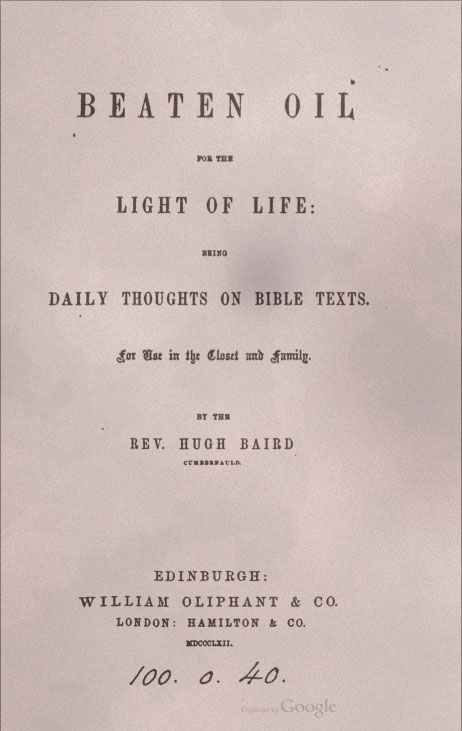Sins Are a Barrier to Prosperity

Beaten Oil
Today's Devotional
He who conceals his transgressions will not prosper —Proverbs 28:13 (NASB).
Think of man’s sins . . . and the invariable consequence.
“His sins.” They are numerous. God requires us to love him with all our heart. Now, where is the hour of our life we have done this? He requires us to serve him, and do good to others, and how far have we come short? They are highly aggravated, committed in the enjoyment of numerous favors, committed in defiance of light and knowledge, and committed with the certainty of reaping their bitter fruits. They expose us to great and immediate danger. “The wages of sin is death” [Romans 6:23]. “Whosoever shall keep the whole law, and yet offend in one point, is guilty of all” [James 2:10]. If the guilt of one sin binds a man over to punishment, how fearful the punishment which sins more in number than the stars of heaven will incur!
“He that covereth.” In all men there is this propensity. It began in Eden, when our fallen first parents tried to hide themselves from the presence of the Lord, and it has been practised ever since. Some try to cover their sins by denying them; but who can escape the eye of Omniscience? Some cover them by diminishing their number and enormity. They look upon them as misfortunes rather than faults. Some plead the strength of temptation, and endeavor to throw the responsibility of their sins on God or Satan, on education or circumstances. Some cover them by setting off their good deeds against their bad ones, as if a good action could atone for a wicked one. And some put on the cloak of religion to cover their wickedness, or to enable them the more readily to carry it into effect. How vain is it for wicked man to cover his sins! He may deceive himself and others, but he cannot deceive God….
“He shall not prosper.” He shall not prosper in temporal things. True, the wicked often appear to prosper, but a worm is at the root of their gourd; gall is in their cup; while they have no sense of divine favor, no peace of conscience, and no hope of heaven. “I have seen a wicked, violent man spreading himself like a luxuriant tree in its native soil. Then he passed away, and lo, he was no more; I sought for him, but he could not be found” [Psalm 37:35,36 NASB]. He shall not prosper in his soul. His soul shall be like a barren wilderness, “without hope and without God in the world” [Ephesians 2:12]. Instead of soaring to a brighter and better, it shall feed on ashes, and never get higher than the dust. …
About the author and the source
When Hugh Baird wrote Beaten Oil, it was with the intent of explaining more fully the Scripture he selected for the day than did most other devotional books.
Hugh Baird. Beaten Oil for the Light of Life: Being Daily Thoughts on Bible Texts. Edinburgh: William Oliphant & Co., 1862.





